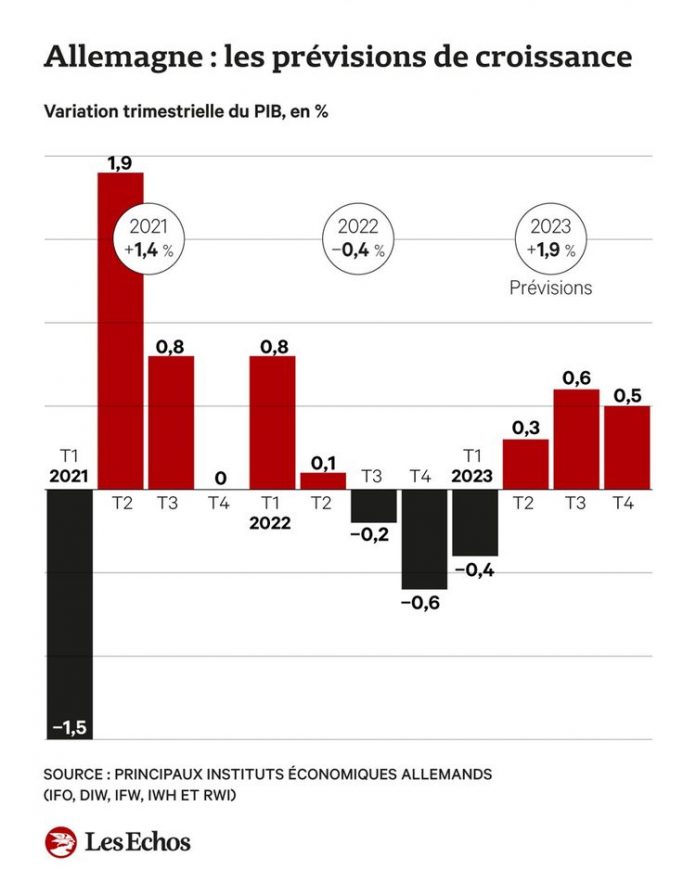Posted Sep 29, 2022, 4:00 PMUpdated on Sep 29, 2022 at 6:11 PM
“Energy crisis: inflation, recession, loss of prosperity”. The title of the report supporting the growth expectations of the four main German economic institutes (Ifo, DIW, IFW, IWH and RWI) presented on Thursday is straightforward and confirms the predictions of the OECD: the coming months will be arid for Germany and they will permanently weaken the country’s economic model.
One of its fundamentals, cheap energy, has indeed collapsed with the war in Ukraine and the gas reductions imposed by Moscow. The four institutes have thus halved their growth forecasts for this year, to 1.4%. They anticipate a recession from the last quarter which will worsen at the beginning of next year, before a probable recovery. For 2023, Germany should see its GDP fall by 0.4%.
Inflation stifles consumption
The recession is limited but the differential with the growth expectations of the experts, of 2.3% in the spring, underlines the stall. In total, the cumulative loss of economic output in 2022 and 2023 would reach 160 billion euros compared to what they still forecast in the spring. In the event of a gas shortage, cold winter and lack of energy sobriety, economists even predict a collapse in GDP of 7.9% next year and 4.2% the following year.
The head of economic affairs at the Kiel Economic Institute, Stefan Kooths, points out that the industry’s well-filled order books and the robustness of the job market will act as shock absorbers. But the strong inflation is coughing up the motor of consumption, which had become, in recent years, the guarantor of growth. Prices rose 10% year on year in September, according to the Federal Statistical Office (Destatis) and are expected to rise another 8.8% next year.
In this context, economists advocate targeted support for the most fragile players, without excessively fueling inflation. They thus welcome the reform of the housing allowance including aid for heating. Adopted on Wednesday by the Council of Ministers, it should benefit 2 million low-income households. On the other hand, they are more critical of the gas price cap announced Thursday by the coalition.
An energy policy to be clarified
This subsidy is likely to support gas consumption. In the same way, economists warn against the principle of too broad aid to businesses. “Given the permanent increase in energy prices, we must ensure that there are no sustainable subsidies to companies that are no longer profitable,” they write. To distinguish between viable companies and others, Stefan Kooths calls on the government to adopt a clear energy policy.
we need to define a new energy strategy for the next 5 to 10 years
Stefan Kooths Head of Economic Affairs at the Kiel Institute of Economics
“Russian gas as a pillar of a transition to a carbon-free economy is no longer an option, we must define a new energy strategy not just for next winter but for the next 5 to 10 years”, specifies the economist . This policy will determine the “new normal” of energy prices and, in turn, the viability of the various economic models.
The specialist in industrial economics at the Ifo, Oliver Falck, however, relativizes the threat of deindustrialisation. He recalls that the most energy-consuming players represented in 2020 only 21% of the gross added value of the industry and 15% of its jobs, according to the Federal Office of Statistics.















